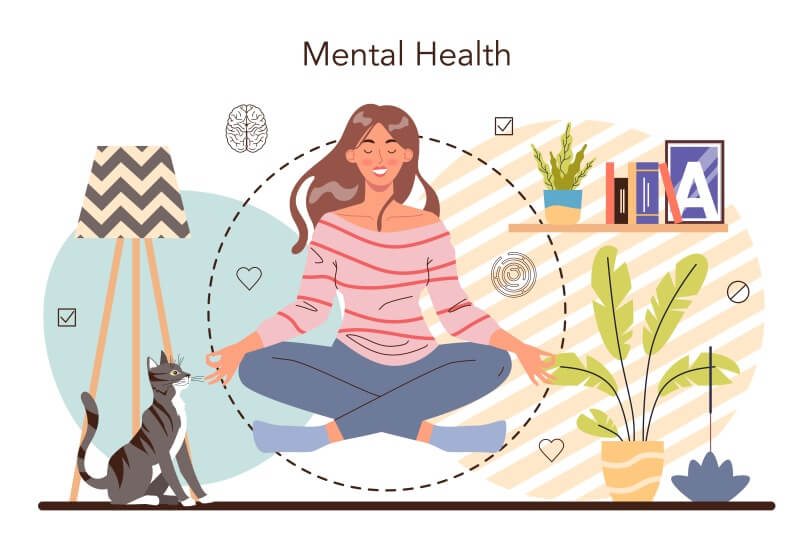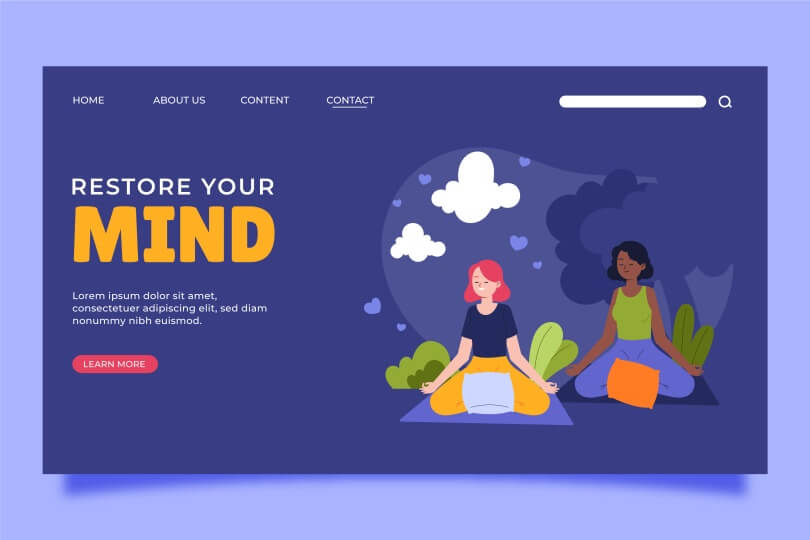Table of Contents
The Connection Between Stress and Habit Formation

The Subconscious Processing of Stress
Our minds are intricate landscapes where the conscious and the subconscious intertwine, especially when it comes to the impact of stress and habits. The subconscious mind processes stress in ways that profoundly influence habit formation, an area ripe for exploration and understanding.
Understanding the Subconscious Mind
Consider the subconscious as an autopilot system that regulates our involuntary actions, such as breathing and heart rate, while also influencing our conscious thoughts and behaviors. This facet of our mind is moulded by experiences and repeated patterns, contributing to habit formation. In the realm of managing stress for habits, it’s crucial to recognize that the subconscious mind can both generate stress responses and be reshaped by them.
For instance, subconscious stress may manifest in automatic reactions like increased anxiety in certain situations. If these reactions are repeated, the stress habit connection solidifies, leading to the formation of stress-related habits such as nail-biting or overeating. This cycle shows just how influential the subconscious is in forming and maintaining habits.
The Role of Repetition in Habit Formation
Repetition is key to habit formation. When an action is repeated consistently, neural pathways become entrenched in the subconscious, making the action almost automatic. This is where the term ‘habit’ truly gains its significance. Habits, whether beneficial like exercise or detrimental like smoking, become embedded in our neural framework.
- Consider someone who habitually checks their phone upon waking. Over time, this behavior becomes a subconscious act, performed without active thought.
- In contrast, a person might consciously decide to practice meditation to manage stress. With repetition, this too can transform into a subconscious routine, replacing negative stress reactions with more positive ones.
- The habit formation stress link is not only inherent to negative habits but can also be harnessed to create positive lifestyle changes.
Acknowledging the stress habit connection offers a profound insight into personal development. By consciously shaping our responses to stress, we can influence our subconscious mind, steering our habit formation in a direction that promotes well-being.
Managing Stress for Positive Habit Formation
Ironically, stress management itself can become a habit. Consider the incorporation of regular exercise, adequate sleep, and healthy eating into one’s lifestyle. Over time, these behaviors can evolve from conscious strategies into automatic responses to stress, bolstered by the resilient power of the subconscious mind.
In summary, delving into the nuances of subconscious stress and habit formation stress unravels a landscape where conscious intervention can guide subconscious processes. Understanding this intricate relationship enables us to methodically reshape our habits, empowering us to lead healthier, less stressed lives. By consciously engaging with our stress responses and repetitive behaviors, we possess the ability to rewrite the script of our subconscious, fostering habits that are in harmony with personal growth and development.
Stress-Induced Habit Patterns
Understanding the complex relationship between stress and habits is essential for fostering mental development and establishing healthy routines. Often, subconscious stress compels us into automatic behavior patterns that handle immediate discomfort but may not align with our long-term goals.
Decoding the Stress-Habit Connection
Life’s pressures can make us reach for quick fixes, like binging on comfort food or avoiding exercise. These responses are part of the stress habit connection. Habits, after all, are the brain’s way of saving effort. When we’re stressed, our subconscious mind prompts us to revert to these learned shortcuts to alleviate the tension temporarily. This mechanism lies at the heart of how habit formation stress operates.
Researchers have found that stress reinforces neural pathways associated with habitual behavior. Managing stress for habits, therefore, involves creating new, healthy routines that your mind can adopt as automatic responses. Here are practical strategies for rewiring stress-induced habits:
- Awareness: Start by recognizing stress-related cues that trigger unhealthy habits. Keep a journal to identify patterns.
- Substitution: Replace a negative habit with a positive one. For example, instead of snacking when stressed, take a brisk walk.
- Relaxation Techniques: Integrate stress-management practices such as meditation or deep-breathing exercises into your daily routine.
Creating Sustainable Habit Change Under Stress
Changing habits is challenging, especially under stress. Success in habit formation under stress depends on understanding the psychological triggers that lead to stress-related behaviors. Developing strategies for managing stress for habits is crucial; cognitive-behavioral techniques and mindfulness practices can be particularly effective in addressing subconscious stress.
To solidify new habits, repeated practice in stress-free environments is helpful before these habits can withstand the test of high-pressure situations. This approach reduces the influence of stress on habit formation, ensuring that your new, healthier routines are resilient.
Mitigating the Effects of Stress on Habit Formation
To break the cycle of stress-induced habits, it is essential to mitigate the effects of stress on the mind and body. Stress and habits influence each other in a feedback loop, but by implementing techniques such as progressive muscle relaxation or engaging in regular physical activity, you can limit the impact of stress habit connection.
In conclusion, by understanding the intricate workings of the subconscious mind and its role in habit formation stress, individuals can take informed steps toward improving their overall well-being. By integrating these practices into life, managing stress for habits becomes a more attainable goal and paves the way for personal growth and improved mental health.
Mechanisms of Subconscious Influence on Behavior

The Role of the Subconscious in Habitual Responses to Stress
Understanding our reactions to stress and how habit formation influences our subconscious responses is paramount to managing daily pressures effectively. The intricate relationship between stress and habits is a fascinating area that binds psychology and neurology. Our brains, wired to seek patterns and consistency, often latch onto routines in response to stress – a phenomenon intimately connected with the stress habit connection.
The Subconscious Stress Response System
Within our subconscious mind lies an automatic processing center that takes over in stressful situations. This mechanism can be helpful, like a skilled pilot handling a turbulent flight, but it can also drive us into troublesome, repetitive behaviors. Understanding subconscious stress responses is akin to untying a complex knot; we must trace the loop of neural pathways to reveal how they form unconscious reactions.
Consider a common stressor: heavy workload. When overwhelmed, one person might respond by biting their nails – a physical habit born from stress. Meanwhile, another may take a walk, initiating positive stress relief habits. These divergent paths illustrate how the subconscious mind and habit formation interact.
To foster better stress responses, we should analyze our daily routines, pinpointing what we do – mindlessly – from the moment stress strikes.
Breaking and Making Habits
Breaking the cycle of negative stress responses requires conscious effort and a dash of neuroscience. To rewrite the scripts in our subconscious, we focus on habit formation stress techniques. Neural plasticity is our ally here, allowing us to recalibrate our brains to form new, healthier responses.
For instance, if responding to a heated email by snacking is your stress habit, rearranging your environment helps. A fruit bowl where there were sweets, or a stress ball where you keep your snacks, can nudge your neural pathways towards a new habit.
However, establishing a new routine is not a one-off task. It takes consistent practice. Repeatedly choosing the fruit or squeezing the stress ball reinforces these positive actions until they, too, sink into the fabric of your subconscious.
Long-Term Strategies for Managing Stress
In terms of managing stress for habits, long-term strategies are crucial. This could involve mindfulness meditation, where conscious awareness of the present moment helps shed the weight of subconscious stress. Additionally, cognitive-behavioral therapy (CBT) offers tools to reshape thought patterns and, consequently, behavior.
Scientific studies show that practices like meditation and CBT can alter brain structure, strengthening areas that regulate emotion and weaken those tied to stress. The insight here is empowering: you are not at the mercy of your subconscious stress responses.
Ultimately, understanding and reprogramming the powerful interplay between stress and habits can lead to profound personal transformation. Habits, once perceived as stubborn foes, can become invaluable allies in our quest for a calmer, more composed existence amidst chaos. So next time you’re faced with a stressor, pause, and reflect: is this reaction a habitual subroutine, or can you choose a healthier path?
Transforming Stress-Related Habits through Subconscious Training
Understanding the stress habit connection is crucial for improving our overall well-being and efficacy in habit formation. Stress often plays a hidden role in the development and perpetuation of habits, both good and bad. The subconscious mind, a powerful and less understood part of our cognition, is where many of these stress-related behaviors take root without our conscious awareness.
The subconscious mind can either be a great ally or a formidable obstacle in habit formation stress. It operates below the surface of conscious thought, influencing behavior in ways that we might not immediately recognize. To use the subconscious mind to our advantage, we must learn to manage stress for habits that are healthy and beneficial.
Manifestation of Subconscious Stress
Subconscious stress often manifests itself in automatic responses to certain triggers. For example, consider the stress and habits involved in emotional eating. An individual may not consciously decide to seek comfort in food when stressed; it is the subconscious mind triggering this habitual response. Identifying these patterns is the first step in retraining the subconscious mind.
- Recognizing cues: One practice involves becoming aware of the external and internal cues that lead to automatic stress responses. This might involve tracking behaviors to identify patterns.
- Creating new responses: Once identified, the individual can create a new, positive habit to perform in place of the old one. This might involve deep breathing or going for a walk when the urge to stress eat arises.
- Reinforcement: Positive habits need reinforcement. This can be achieved through repeated practice, envisioning success, or using rewards to strengthen the new behavior loop in the subconscious mind.
Techniques for Retraining the Subconscious Mind
Modern research suggests various techniques for modifying the subconscious processes involved in habit formation stress. Practices such as mindfulness and meditation can improve our ability to notice the automatic nature of the stress habit connection and introduce a pause between stimulus and response.
- Mindfulness: By maintaining a moment-to-moment awareness of our thoughts, feelings, and environment, we become better equipped to intercept automatic stress responses and form new habits.
- Meditation: Regular meditation can actually rewire the brain, strengthening areas associated with self-control and awareness, reducing the subconscious stress influence in habit formation.
- Visualization: Visualizing oneself performing a new habit instead of the stress-induced one can enhance the connection between conscious intention and subconscious action.
Through understanding and reprogramming the subconscious mind with these strategies, managing stress for habits becomes more feasible. It lays the foundation for lasting change, transforming stress reactions into responses that serve our health and productivity.
Building a solid foundation in subconscious training helps combat the automatic nature of stress and habits. With dedicated practice, it is possible to break free from the cycle of stress habit connection and cultivate a set of behaviors that enhance rather than hinder our lives.
Summary
Our daily routines and responses to stress are deeply connected to a concept known as The Connection Between Stress and Habit Formation. This intricate link plays a significant role in how we develop both positive and negative habits, often without our conscious awareness.
Understanding the role of the subconscious mind is paramount in this process. It acts as an autopilot, overseeing involuntary functions while simultaneously influencing our voluntary behaviors. Repetitive experiences, particularly those related to stress, can entrench neural pathways, leading to automatic responses that become habitual.
To tackle habit formation stress, one must become aware of stress triggers and consciously craft healthier habits. This emphasizes the importance of managing stress for habits that align with our long-term well-being. For instance, the habit of reaching for junk food when stressed could be replaced with a brisk walk or a few minutes of deep-breathing exercises.
Strategies for Reshaping Habits Under Stress
When stress hits, our subconscious can either become our ally or our adversary. By using effective techniques, we have the power to redirect our automatic stress responses into actions that serve our health and productivity. Here are some strategies:
- Identification: Acknowledge the cues that ignite stress-related habits.
- Substitution: Introduce healthy routines that counteract stress-induced behavior.
- Reinforcement: Consistently practice positive habits to make them second nature.
It’s crucial to implement long-term strategies to change the narrative written by our subconscious minds. Cognitive-behavioral techniques and mindfulness are tools that help in managing stress for habits sustainably. The reinforcement of positive behaviors through repetition paves the way for lasting change, ensuring that these new habits become deeply ingrained.
One must consider that the stress habit connection isn’t simply about avoidance of negative habits; it also provides a blueprint for cultivating positive behaviors. By recognizing the stress signals and intentionally choosing healthier responses, we can reprogram our subconscious mind, enabling a more resilient response system to stressors.
In conclusion, the subconscious mind and habit formation stress are intricately linked. Through strategic awareness and changes to our daily routines, it’s possible to harness the stress habit connection for our benefit. Practices such as mindfulness, meditation, and conscious substitution can break the cycle of stress-induced habits and create a foundation for managing stress for habits that promote personal growth and improved mental health. Understanding and navigating this complex relationship equips us with the tools to rewrite our subconscious programming for a more fulfilling and less stressed life.
FAQ – The Connection Between Stress and Habit Formation
How does subconsciously processed stress alter our daily habit patterns?
Subconsciously processed stress often manifests through automatic coping mechanisms that may alter our daily habits, such as increased reliance on comfort foods, substance use, or retreat into less demanding routines to reduce perceived pressure. Over time, these subtle shifts can lead to the establishment of less healthy habits as the mind seeks to maintain a sense of balance and minimize discomfort, with individuals possibly becoming less aware of the changes as they become ingrained in their daily lives.




